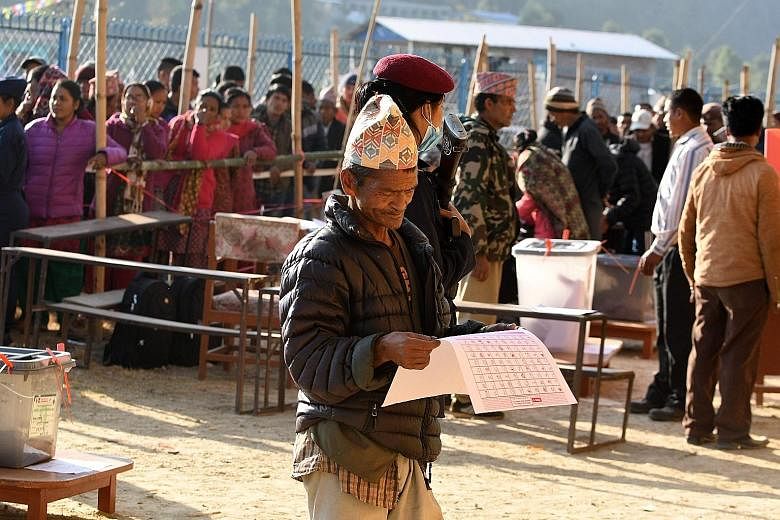BALEPHI • Nepalis across the country's mountainous north voted yesterday in elections that could herald change after 20 ruinous years marked by a bloody Maoist insurgency, a devastating earthquake and crippling political instability.
The historic vote marks the final step of a drawn-out peace process, which began in 2006 with the end of the civil war between the Maoists and the state.
More than two million people - about 65 per cent of eligible voters - voted for representatives in new national and provincial Parliaments.
The two-phase elections will establish the country's first provincial assemblies as laid out in a post-war Constitution that aims to devolve power from the top-heavy central governments to seven newly created provinces.
Nepal's tumultuous transition from monarchy to democracy has been marred by crippling instability that has seen 10 leaders hold power in 11 years - some of them more than once - hampering development and recovery from the earthquake that struck in 2015.
The areas that were worst hit by the quake, which killed 9,000 and destroyed half a million homes, voted yesterday, with many expressing hope that sluggish reconstruction would be kick-started by the political change.
"I hope to see more development and better services in our district," said first-time voter Shanta Bhujel, 18, who cast his ballot in Chautara, a town east of the capital Kathmandu.
Sporadic violence injured dozens in the lead-up to the polls, mostly blamed on a splinter faction of the Maoist Party. The faction pledged to disrupt the election.
Many in the impoverished Himalayan nation walked for hours to their nearest polling station, while in the remote west, voters braved sub-zero temperatures and snow. But nothing stopped a 114-year-old woman from casting her ballot in the western district of Baitadi.
The new Constitution, finally approved in 2015, mandates a sweeping overhaul of the political system, which should limit the impact of the horse-trading in Kathmandu on much-needed development in the rest of the country.
Rules under the new charter allocate a proportion of seats in the federal and provincial assemblies to women and people from indigenous communities and the lowest Dalit caste.
The rules will also weed out some fringe parties from the Parliaments and raise the bar for ousting a prime minister, leading to hopes that the next government could be the first to last a full five-year term.
"Our vote this time is in the hope that the next time we vote the country is in a better condition," said hotel owner Bhakta Lal Shrestha after casting his ballot in Balephi just before polling closed.
However, analysts warn that the impact of the changes could be limited, with the three parties that have dominated the political stage since the end of the conflict expected to take the lion's share of seats.
The Maoist Party of the former rebels has formed an electoral alliance with the communist CNP-UML, fielding candidates jointly in key races.
The powerful bloc has left the ruling party, the centrist Nepali Congress, on the back foot and forced to look to smaller parties in a bid to remain in power.
"Since there is no real ideological difference between the two alliances any more, what we need for stable politics is a majority government with a strong opposition to keep it in check," the English-language Nepali Times wrote in an editorial yesterday. "At this moment, that is the best we can hope for."
AGENCE FRANCE-PRESSE

